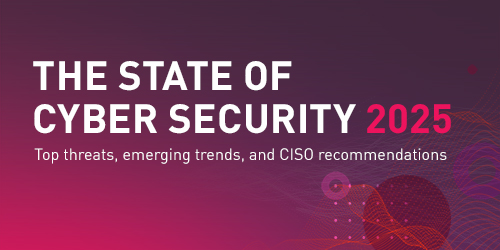Check Point® Software Technologies Ltd. (NASDAQ: CHKP), a leading provider of cybersecurity solutions globally, has published its Global Threat Index for March 2023. Last month, researchers uncovered a new malware campaign for Emotet Trojan, which rose to become the second most prevalent malware last month.
As reported earlier this year, Emotet attackers have been exploring alternative ways to distribute malicious files since Microsoft announced they will block macros from office files. In the latest campaign, the attackers have adopted a new strategy of sending spam emails containing a malicious OneNote file. Once opened, a fake message appears to trick the victim into clicking the document, which downloads the Emotet infection. Once installed, the malware can gather user email data such as login credentials and contact information. The attackers then use the gathered information to expand the reach of the campaign and facilitate future attacks.
“While big tech companies do their best to cut off cybercriminals at the earliest point, it’s near impossible to stop every attack from bypassing the security measures. We know that Emotet is a sophisticated Trojan and it is no surprise to see it has managed to navigate Microsoft’s latest defenses. The most important thing people can do is make sure they have appropriate email security in place, avoid downloading any unexpected files and adopt heathy skepticism about the origins of an email and its contents” said Maya Horowitz, VP Research at Check Point Software.
CPR also revealed that “Apache Log4j Remote Code Execution” was the most exploited vulnerability, impacting 44% of organizations globally, followed by “HTTP Headers Remote Code Execution” with 43% of organizations worldwide and “MVPower DVR Remote Code Execution” with a global impact of 40%.
Top Malware Families
*The arrows relate to the change in rank compared to the previous month.
Qbot was the most prevalent malware last month with an impact of more than 10% on worldwide organizations respectively, followed by Emotet and Formbook with a 4% global impact.
- ↔ Qbot – Qbot AKA Qakbot is a banking Trojan that first appeared in 2008. It was designed to steal a user’s banking credentials or keystrokes and is often distributed via spam emails. Qbot employs several anti-VM, anti-debugging and anti-sandbox techniques to hinder analysis and evade detection.
- ↑ Emotet – Emotet is an advanced, self-propagating and modular Trojan. Emotet used to be employed as a banking Trojan but has recently been used as a distributor to other malware or malicious campaigns. It uses multiple methods for maintaining persistence and evasion techniques to avoid detection. In addition, it can be spread through phishing spam emails containing malicious attachments or links.
- ↓ FormBook – FormBook is an Infostealer targeting Windows OS and was first detected in 2016. It is marketed as Malware as a Service (MaaS) in underground hacking forums for its strong evasion techniques and relatively low price. Formbook harvests credentials from various web browsers, collects screenshots, monitors and logs keystrokes and can download and execute files according to orders from its C&C.
Top Attacked Industries Globally
Last month, Education/Research remained the most attacked industry globally, followed by Government/Military and then Healthcare.
- Education/Research
- Government/Military
- Healthcare
Top Exploited Vulnerabilities
Last month, “Apache Log4j Remote Code Execution” was the most exploited vulnerability, impacting 44% of organizations globally, followed by “HTTP Headers Remote Code Execution” with 43% of organizations worldwide and “MVPower DVR Remote Code Execution” with a global impact of 40%.
- ↑ Apache Log4j Remote Code Execution (CVE-2021-44228) – A remote code execution vulnerability exists in Apache Log4j. Successful exploitation of this vulnerability could allow a remote attacker to execute arbitrary code on the affected system.
- ↑ HTTP Headers Remote Code Execution (CVE-2020-10826,CVE-2020-10827,CVE-2020-10828,CVE-2020-13756) – HTTP headers let the client and the server pass additional information with an HTTP request. A remote attacker may use a vulnerable HTTP Header to run arbitrary code on the victim machine.
- ↑MVPower DVR Remote Code Execution – A remote code execution vulnerability exists in MVPower DVR devices. A remote attacker can exploit this weakness to execute arbitrary code in the affected router via a crafted request.
Top Mobile Malwares
Last month, Ahmyth moved to the top spot as the most prevalent mobile malware, followed by Anubis and Hiddad.
- AhMyth – AhMyth is a Remote Access Trojan (RAT) discovered in 2017. It is distributed through Android apps that can be found on app stores and various websites. When a user installs one of these infected apps, the malware can collect sensitive information from the device and perform actions such as keylogging, taking screenshots, sending SMS messages, and activating the camera.
- Anubis – Anubis is a banking Trojan malware designed for Android mobile phones. Since it was initially detected, it has gained additional functions including Remote Access Trojan (RAT) functionality, keylogger, audio recording capabilities and various ransomware features. It has been detected on hundreds of different applications available in the Google Store.
- Hiddad – Hiddad is an Android malware which repackages legitimate apps and then releases them to a third-party store. Its main function is to display ads, but it can also gain access to key security details built into the OS.
Check Point’s Global Threat Impact Index and its ThreatCloud AI Map is powered by Check Point’s ThreatCloud AI intelligence. ThreatCloud AI provides real-time threat intelligence derived from hundreds of millions of sensors worldwide, over networks, endpoints and mobiles. The intelligence is enriched with AI-based engines and exclusive research data from Check Point Research, the intelligence and research Arm of Check Point Software Technologies.
The complete list of the top ten malware families in March can be found on the Check Point blog.
Follow Check Point Research via:
Blog: https://research.checkpoint.com/
Twitter: https://twitter.com/_cpresearch_
About Check Point Research
Check Point Research provides leading cyber threat intelligence to Check Point Software customers and the greater intelligence community. The research team collects and analyzes global cyber-attack data stored on ThreatCloud AI to keep hackers at bay, while ensuring all Check Point products are updated with the latest protections. The research team consists of over 100 analysts and researchers cooperating with other security vendors, law enforcement and various CERTs.
About Check Point Software Technologies Ltd.
Check Point Software Technologies Ltd. (www.checkpoint.com) is a leading provider of cyber security solutions to corporate enterprises and governments globally. Check Point Infinity’s portfolio of solutions protects enterprises and public organizations from 5th generation cyber-attacks with an industry leading catch rate of malware, ransomware, and other threats. Infinity comprises four core pillars delivering uncompromised security and generation V threat prevention across enterprise environments: Check Point Harmony, for remote users; Check Point CloudGuard, to automatically secure clouds; and Check Point Quantum, to protect network perimeters and datacenters, all controlled by the industry’s most comprehensive, intuitive unified security management; Check Point Horizon, a prevention-first security operations suite. Check Point protects over 100,000 organizations of all sizes.





